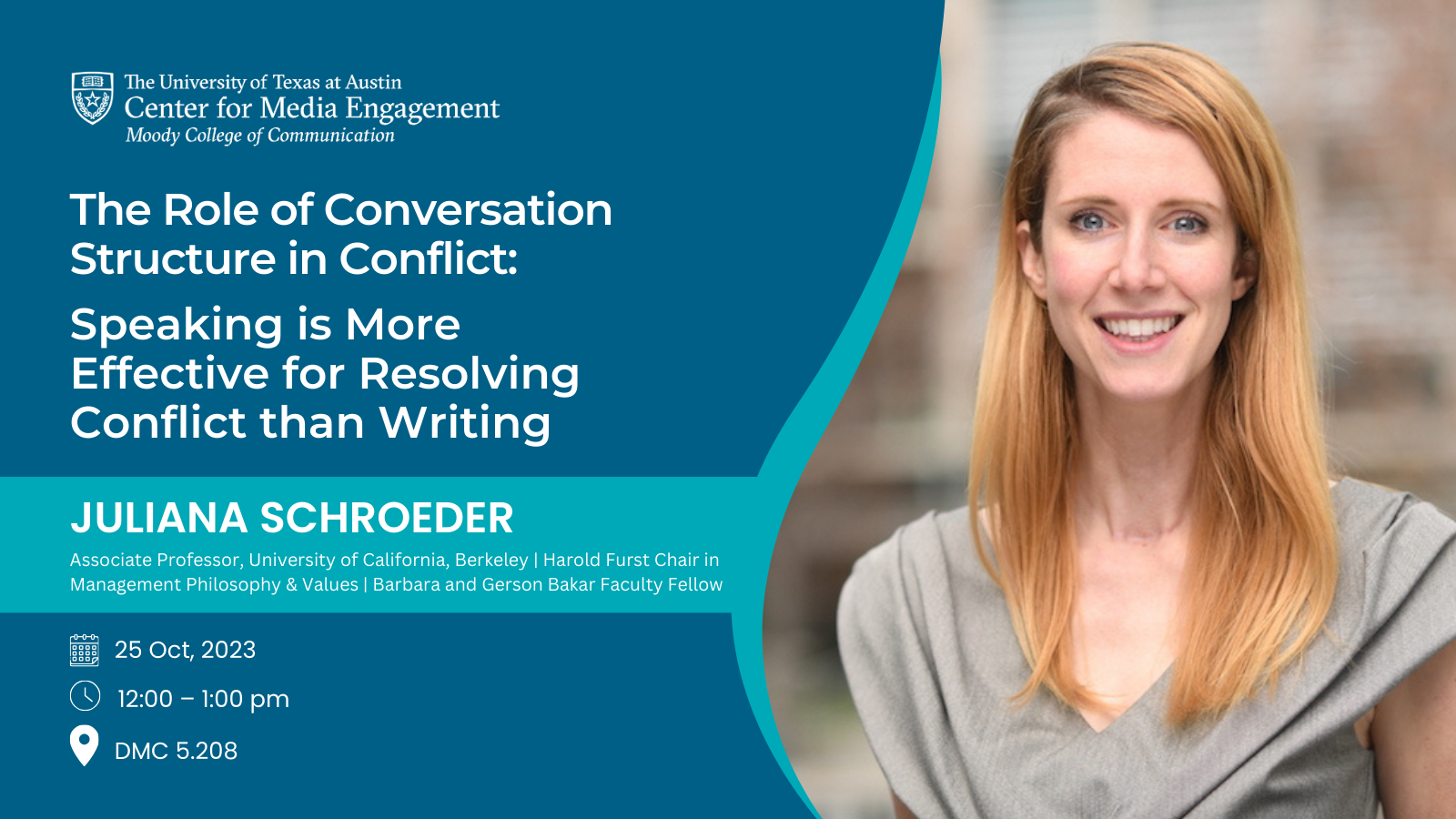
Abstract
Resolving conflict is more important than ever as political and social dissent reaches record levels across the world. While it is clear that conversation between opponents is necessary to address conflict, an open question is how conversation structure influences conflict resolution. The current research examines a key aspect of conversation structure—the medium by which it occurs—and tests whether spoken (e.g., face-to-face, phone) versus written (e.g., online) conversations change conflict resolution outcomes. An initial experiment (Experiment 1a, n = 201) suggests that political opponents prefer to write to each other than to video-chat or audio-chat to address disagreement, expecting that writing would reduce conflict and increase conversational responsiveness (e.g., felt understanding, enjoyment). But ten subsequent experiments (n = 3,930) testing the real effect of the conversation medium indicate the opposite: writing (vs. speaking) harms conflict resolution. In Experiments 2-4, laboratory participants who reported strongly disagreeing on pre-selected controversial topics were randomly assigned to have conversations via different media (e.g., speaking, writing), and subsequently reported impressions of their conversation partner (i.e., humanization), conversation experiences (i.e., perceived responsiveness, conflict), and attitude change. Across these experiments, pairs who spoke (vs. wrote) humanized each other more, experienced more responsiveness and less conflict, and had greater alignment in resulting attitudes. Furthermore, the effect of medium was robust to how long pairs engaged (e.g., 6 vs. 12-minute conversations in Experiment 3) and seemed to occur even after the first substantive exchange of content (e.g., one exchange vs. multiple exchanges in Experiment 4). A follow-up experiment (Experiment 5) demonstrated that external observers perceive (transcribed) spoken conversations as politer and more civil than written conversations even when observers are blind to the medium, and that such differences are observed within the first few exchanges in the conversation. To examine the robustness of these results in the field, we partnered with an organization trying to increase civil discourse among political opponents in colleges (Bridge USA), conceptually replicating and extending our earlier lab experiments (Experiments 6a-b and 7 conducted at three college campuses across America). Our final set of experiments provide evidence for at least two potential explanations for the differences in speaking and writing. First, the greater synchronicity in spoken (vs. written) conversations (Experiment 8) improves conflict resolution. Second, even holding semantic language constant, the paralinguistic cues in spoken conversation seem to convey greater humanness in particular (Experiment 9). We also provide evidence against other possible explanations (e.g., greater backchanneling in spoken than written conversations, Supplemental Experiment S1). In aggregate, this research indicates that although people sometimes prefer to write than speak with an opponent, the spoken medium is probably better-suited than the written medium for resolving conflict. These findings have implications for how communication technology (e.g., social media) may shape discourse. Conflict is born not just from disagreement but from the structure of a conversation itself.
Speaker Bio
Juliana Schroeder is an an associate professor in the Management of Organizations group at Berkeley Haas. She holds the Harold Furst Chair in Management Philosophy and Values, and serves as the Barbara and Gerson Bakar Faculty Fellow. Her research explores how people make social inferences about others. She is a Faculty Affiliate in the Social Psychology Department, the Cognition Department, and the Center for Human-Compatible AI at UC Berkeley. She teaches the Negotiations and Conflict Resolution course at Haas.
Schroeder researches how people navigate their social worlds, including how people form inferences about others’ mental capacities and how these inferences influence their interactions. In particular, she studies how language affects the expression of one’s own—and the evaluation of others’—mental capacities. Her research has been published in a wide range of academic journals and in several book chapters. It has been featured by media outlets, including the New York Times, Washington Post, Harvard Business Review, NPR, and the Today Show. She has received funding from the National Science Foundation and awards from the Association for Psychological Science and the American Psychological Association. In addition to conducting research and teaching, Schroeder is a co-founder of the Psychology of Technology Institute, which supports and advances scientific research studying psychological consequences and antecedents of technological advancements. Her educational background includes a BA in psychology and economics from the University of Virginia, an MBA from the University of Chicago’s Booth School of Business, and an MA and PhD in psychology and business from the University of Chicago.
Details
Past occurrences
- October 25th, 2023 - 12:00pm to 1:00pm
Event Categories: Guest Speaker Lecture
Location: DMC 5.208
Other
Target audience: Alumni , Faculty , Students

